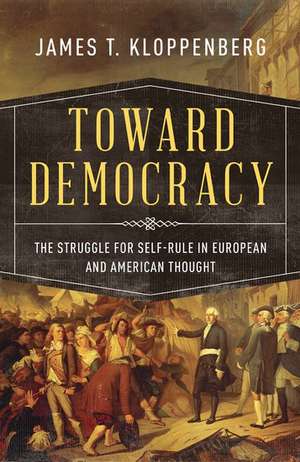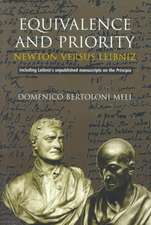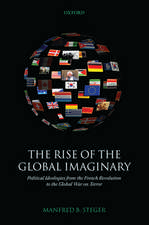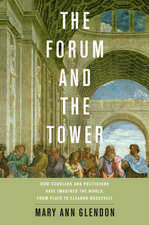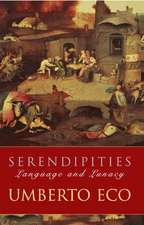Toward Democracy: The Struggle for Self-Rule in European and American Thought
Autor James T. Kloppenbergen Limba Engleză Paperback – 12 dec 2019
| Toate formatele și edițiile | Preț | Express |
|---|---|---|
| Paperback (1) | 176.49 lei 10-16 zile | |
| Oxford University Press – 12 dec 2019 | 176.49 lei 10-16 zile | |
| Hardback (1) | 187.88 lei 10-16 zile | |
| Oxford University Press – 28 iul 2016 | 187.88 lei 10-16 zile |
Preț: 176.49 lei
Preț vechi: 195.56 lei
-10% Nou
Puncte Express: 265
Preț estimativ în valută:
33.77€ • 35.26$ • 27.89£
33.77€ • 35.26$ • 27.89£
Carte disponibilă
Livrare economică 14-20 martie
Preluare comenzi: 021 569.72.76
Specificații
ISBN-13: 9780190056711
ISBN-10: 0190056711
Pagini: 912
Dimensiuni: 208 x 142 x 48 mm
Greutate: 1.04 kg
Editura: Oxford University Press
Colecția OUP USA
Locul publicării:New York, United States
ISBN-10: 0190056711
Pagini: 912
Dimensiuni: 208 x 142 x 48 mm
Greutate: 1.04 kg
Editura: Oxford University Press
Colecția OUP USA
Locul publicării:New York, United States
Recenzii
In exploring the variety of democratic forms that arose in the Atlantic world, Kloppenberg reminds readers that popular self-government was not preordained by modernity nor brought into the world at a single heroic moment.
The book dazzles through its range and sweep, offering new interpretations of familiar texts and drawing attention to unfamiliar ones.
This ambitious book is much more than a description of successive democratic ideals. Kloppenberg identifies a specific set of principles that characterize democracy and another set of conditions of possibility for a democratic order...The historical narrative illuminates the history of democratic thought and simultaneously advances an argument for specific institutional features of modern democracy.
James T. Kloppenberg's thoughtful and ambitious intellectual history of democracy is most welcome. Toward Democracy: The Struggle for Self-Rule in European and American Thought is learned, well-written, and jargon-free. Its scope is immense...With Toward Democracy, James Kloppenberg has written a strikingly thoughtful work on the democratic experiment. He is an eloquent partisan who writes seriously about self-limitation and the moral foundations of democracy.
An original discussion of how the idea of democracy took root and has been transformed in the West...As [Kloppenberg] observes, the ability of people to govern themselves without an entrenched class of overseers has long been a matter of controversy, though the argument has a chicken-and-egg quality to it . . . Surveying the subsequent political landscape, Kloppenberg allows that the debate has found plenty of room to continue to rage. Elsewhere, he writes of the idea that the people have not just the right, but also the duty to resist 'tyrants who flout divine law,' as well as the idea that the source of authority truly lies in the consent of the governed and 'the conscience of individual citizens.' . . . A book to read, profitably, alongside Karl Popper's The Open Society and Its Enemies." -Kirkus Reviews
This is intellectual history on a monumental scale. In a time when democracy again seems tragically fragile, James Kloppenberg has given us a sweeping, searching and enormously timely account of its development in European and American thought. Starting with Michel de Montaigne reflecting upon savage religious violence in France, and concluding with Abraham Lincoln trying to bind up America's wounds at the end of the Civil War, Kloppenberg's account is framed by bloodshed, underlining his central argument about just how difficult the struggle has been for democratic ideals to prevail." -David A. Bell, Lapidus Professor, Department of History, Princeton University
James Kloppenberg has spent years thinking fruitfully and writing wisely about both the moral underpinnings of democracy and the interaction between American and European thought. Toward Democracy is his magnum opus, and what an extraordinary contribution it is. Our democracies would work better if, as Kloppenberg suggests, we followed St. Paul's injunction to see through each other's eyes and think through each other's minds." -E. J. Dionne, Jr., author of Why the Right Went Wrong and Our Divided Political Heart
Learned and magisterial, James Kloppenberg's important history of democracy in modern European and American thought is not just a political story but a moral one, of democracy as an elusive ethical ideal requiring self-restraint and reciprocity." -Caroline Winterer, Director and Anthony P. Meier Family Professor in the Humanities, Stanford Humanities Center
This impressive work, a monument to the author's lifetime of historical scholarship, provides a lucid, richly informed narrative about the struggle for democracy across the centuries. . . . Kloppenberg's focus is on the ideas of great thinkers: His book demonstrates the recovery of intellectual history after years of neglect." -Daniel Walker Howe, Pulitzer-Prize-winning author of What Hath God Wrought: The Transformation of America, 1815-1848
Toward Democracy will surely become a vital guide as citizens try to recalibrate the balance of freedom and equality for our own time." -Commonweal Magazine
Kloppenberg braids minor key notes into his symphony of world-altering achievements." -Shepherd Express
Let there be no doubt: Toward Democracy makes a major contribution to both scholarship and citizenship in America." -Harvard Magazine
With Toward Democracy, James T. Kloppenberg has undertaken nothing less than the story of democracy 'as it was imagined, understood, and practiced' from its origins in ancient Greece to its modern emergence in the 18th and 19th centuries. . . . In a series of finely crafted summaries of European thinkers and their American interpreters (including Adams, Jefferson, Madison and Franklin), he shows how the genius of democracy took shape in the American mind and then asserted itself in independence and in the ratification of the Constitution." -The Wall Street Journal
The book dazzles through its range and sweep, offering new interpretations of familiar texts and drawing attention to unfamiliar ones.
This ambitious book is much more than a description of successive democratic ideals. Kloppenberg identifies a specific set of principles that characterize democracy and another set of conditions of possibility for a democratic order...The historical narrative illuminates the history of democratic thought and simultaneously advances an argument for specific institutional features of modern democracy.
James T. Kloppenberg's thoughtful and ambitious intellectual history of democracy is most welcome. Toward Democracy: The Struggle for Self-Rule in European and American Thought is learned, well-written, and jargon-free. Its scope is immense...With Toward Democracy, James Kloppenberg has written a strikingly thoughtful work on the democratic experiment. He is an eloquent partisan who writes seriously about self-limitation and the moral foundations of democracy.
An original discussion of how the idea of democracy took root and has been transformed in the West...As [Kloppenberg] observes, the ability of people to govern themselves without an entrenched class of overseers has long been a matter of controversy, though the argument has a chicken-and-egg quality to it . . . Surveying the subsequent political landscape, Kloppenberg allows that the debate has found plenty of room to continue to rage. Elsewhere, he writes of the idea that the people have not just the right, but also the duty to resist 'tyrants who flout divine law,' as well as the idea that the source of authority truly lies in the consent of the governed and 'the conscience of individual citizens.' . . . A book to read, profitably, alongside Karl Popper's The Open Society and Its Enemies." -Kirkus Reviews
This is intellectual history on a monumental scale. In a time when democracy again seems tragically fragile, James Kloppenberg has given us a sweeping, searching and enormously timely account of its development in European and American thought. Starting with Michel de Montaigne reflecting upon savage religious violence in France, and concluding with Abraham Lincoln trying to bind up America's wounds at the end of the Civil War, Kloppenberg's account is framed by bloodshed, underlining his central argument about just how difficult the struggle has been for democratic ideals to prevail." -David A. Bell, Lapidus Professor, Department of History, Princeton University
James Kloppenberg has spent years thinking fruitfully and writing wisely about both the moral underpinnings of democracy and the interaction between American and European thought. Toward Democracy is his magnum opus, and what an extraordinary contribution it is. Our democracies would work better if, as Kloppenberg suggests, we followed St. Paul's injunction to see through each other's eyes and think through each other's minds." -E. J. Dionne, Jr., author of Why the Right Went Wrong and Our Divided Political Heart
Learned and magisterial, James Kloppenberg's important history of democracy in modern European and American thought is not just a political story but a moral one, of democracy as an elusive ethical ideal requiring self-restraint and reciprocity." -Caroline Winterer, Director and Anthony P. Meier Family Professor in the Humanities, Stanford Humanities Center
This impressive work, a monument to the author's lifetime of historical scholarship, provides a lucid, richly informed narrative about the struggle for democracy across the centuries. . . . Kloppenberg's focus is on the ideas of great thinkers: His book demonstrates the recovery of intellectual history after years of neglect." -Daniel Walker Howe, Pulitzer-Prize-winning author of What Hath God Wrought: The Transformation of America, 1815-1848
Toward Democracy will surely become a vital guide as citizens try to recalibrate the balance of freedom and equality for our own time." -Commonweal Magazine
Kloppenberg braids minor key notes into his symphony of world-altering achievements." -Shepherd Express
Let there be no doubt: Toward Democracy makes a major contribution to both scholarship and citizenship in America." -Harvard Magazine
With Toward Democracy, James T. Kloppenberg has undertaken nothing less than the story of democracy 'as it was imagined, understood, and practiced' from its origins in ancient Greece to its modern emergence in the 18th and 19th centuries. . . . In a series of finely crafted summaries of European thinkers and their American interpreters (including Adams, Jefferson, Madison and Franklin), he shows how the genius of democracy took shape in the American mind and then asserted itself in independence and in the ratification of the Constitution." -The Wall Street Journal
Notă biografică
James T. Kloppenberg is Charles Warren Professor of American History at Harvard, where he teaches European and American intellectual history. He has been elected to the American Academy of Arts and Sciences and the Executive Board of the Organization of American Historians, has served as Pitt Professor at the University of Cambridge and as a visiting professor at the Ecole des Hautes Etudes en Sciences Sociales in Paris, and has held fellowships from the ACLS, NEH, and the Guggenheim, Whiting, and Danforth foundations.
